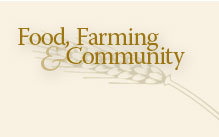About the Curriculum
Audience: The Food, Farming and Community curriculum is designed for adults who are interested in but not particularly knowledgeable about food systems and sustainable agriculture. This includes adult learners in study groups, teachers attending workshops, college students, or anyone seeking to learn more about food systems that benefit personal health, the environment, and the local economy.
Scope: This curriculum is comprised of six 1.5- 2 hour sessions that address a broad scope of sustainable agriculture issues and includes making personal connections with food, the environmental “footprint” of food production, price vs. cost, trends in agriculture, and historic factors affecting today’s food systems. Each session will engage learners in exploring a particular topic and enable them to make connections between personal actions and regional or global policies. Ideas for solutions and action steps are woven throughout and highlighted as a part of the final lesson.
Facilitator / Presenter: A wide range of organizations and networks will be interested in utilizing this curriculum as a part of their own programming – from agriculture and Extension to sustainable and organic networks, libraries, faith based groups, and community education and regional networks. The facilitator or presenter should be knowledgeable and experienced with contemporary agriculture and sustainable practices and able to access information and resources in these areas.
Curriculum Materials: Six lessons each include a facilitator guide and a learner packet as downloadable pdf files. Power point slides include key diagrams, summaries and other main points, and are referenced in the facilitator guide. Summary information and downloadable files for each lesson are accessed here by left column navigation menu.
Sessions/Lessons:
- Introduction to Food, Farming, and Community
- How Should We Grow? Comparing Food Systems
- The Food Footprint
- The High Cost of Cheap Food
- How Did We Get Here? The Development of the “Modern” Food System
- Strategies for Supporting Sustainable Food Systems
Credits: Please always credit the source when you use these materials. For example:
The Food, Farming and Community curriculum has been developed by Creative Change Educational Solutions (Ypsilanti, MI) in collaboration with the Michigan State University Museum as a part of The Voices Project. These resources were developed for organizations to use in their own work: planning, training, building public awareness, and inspiring change around farming, farmers and local food. The Voices Project has been funded by the W. K. Kellogg Foundation.




